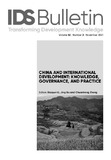Glossary – China and International Development: Knowledge, Governance, and Practice
| dc.contributor.author | Li, Xiaoyun | |
| dc.contributor.author | Gu, Jing | |
| dc.contributor.author | Zhang, Chuanhong | |
| dc.coverage.spatial | China | en |
| dc.date.accessioned | 2021-11-25T11:38:28Z | |
| dc.date.available | 2021-11-25T11:38:28Z | |
| dc.date.issued | 2021-11-29 | |
| dc.identifier.citation | Li, X.; Gu, J. and Zhang, C. (eds) (2021) 'Glossary', IDS Bulletin 52.2: 157–60 | en |
| dc.identifier.issn | 1759-5436 | |
| dc.identifier.uri | https://opendocs.ids.ac.uk/opendocs/handle/20.500.12413/16956 | |
| dc.description.abstract | China’s global engagement with the developing world is changing rapidly in an era where ‘traditional’ aid discourses and the practices of new ‘emerging powers’ in development cooperation are evolving. As the largest South–South cooperation (SSC) provider and the second largest economy in the world, China’s development activities overseas have spurred intense debate over its role as a rising power in international development. Fast-growing activities present both internal and external challenges for China and the world. How to address these challenges and knowledge gaps will not only determine China’s internal governance on development issues, but also its external activities and behaviours that are now having a profound global impact. This issue of the IDS Bulletin brings together studies of the primary institutions and policies that are guiding China’s activities in development cooperation, focusing on the question of what China contributes to international development and the implications for global development cooperation. It also explores a range of cross-cutting topics including: the new Asian development finance and the potential impact of China on development thinking and policies, and China’s development practice and the effectiveness of SSC and triangular cooperation. China’s new initiatives and practices in development cooperation, distinctive from that provided by traditional donors, will reshape the landscape of global development, leading to the generation of new development knowledge and global development cooperation governance architecture. Given China’s growing prominence as a source of development finance, and as an institutional player, there is a real need for greater mutual understanding to promote effective healthy competition in development cooperation. | en |
| dc.description.sponsorship | Foreign, Commonwealth & Development Office | en |
| dc.language.iso | en | en |
| dc.publisher | Institute of Development Studies | en |
| dc.relation.ispartofseries | IDS Bulletin;52.2 | |
| dc.rights | This is an Open Access article distributed under the terms of the Creative Commons Attribution 4.0 International licence (CC BY), which permits unrestricted use, distribution, and reproduction in any medium, provided the original authors and source are credited and any modifications or adaptations are indicated. http://creativecommons.org/licenses/by/4.0/legalcode | en |
| dc.rights.uri | http://creativecommons.org/licenses/by/4.0/ | en |
| dc.subject | Aid | en |
| dc.subject | Development Policy | en |
| dc.subject | Politics and Power | en |
| dc.title | Glossary – China and International Development: Knowledge, Governance, and Practice | en |
| dc.type | Article | en |
| dc.rights.holder | © Authors © Institute of Development Studies 2021 | en |
| dc.identifier.team | Business, Markets and the State | en |
| dc.identifier.doi | 10.19088/1968-2021.126 | |
| rioxxterms.funder | Default funder | en |
| rioxxterms.identifier.project | Default project | en |
| rioxxterms.version | VoR | en |
| rioxxterms.versionofrecord | 10.19088/1968-2021.126 | en |
| rioxxterms.funder.project | 9ce4e4dc-26e9-4d78-96e9-15e4dcac0642 | en |
Files in this item
This item appears in the following Collection(s)
Except where otherwise noted, this item's license is described as This is an Open Access article distributed under the terms of the Creative Commons Attribution 4.0 International licence (CC BY), which permits unrestricted use, distribution, and reproduction in any medium, provided the original authors and source are credited and any modifications or adaptations are indicated. http://creativecommons.org/licenses/by/4.0/legalcode


